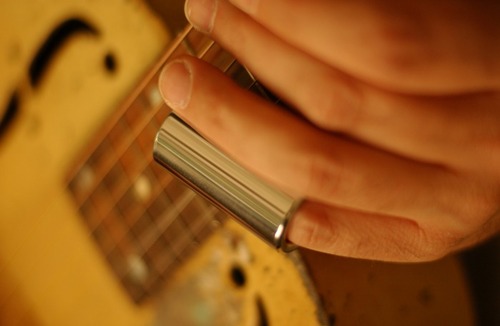LIVING BLUES MAGAZINE
review of AFTER HOURS
Issue # 212 April, 2011
STEVE GRILLS
After Hours
Toogaloo - TCD910
Steve Grills is a staple on the Rochester, New York, blues scene and has been for 30 years. Grills made his musical debut in his brother’s blues band performing between sets of Rochester luminary Joe Beard in the late 1970s at a local club called the K&T Tavern. Now, Grills makes his album debut with After Hours on Rochester’s Toogaloo Label. Also appearing on the album is longtime Grills collaborator and member of his band, pianist Ernest Lane, who is perhaps better known as a member of the Ike and Tina Turner review and occasional partner of Robert Nighthawk, Earl Hooker, and Houston Stackhouse, among others.
After Hours opens with a blistering version of Mercy Dee Walton’s One Room Country Shack, demonstrating both Grills’ guitar skills and Lane’s keyboard mastery. Grills and his band, including veteran bassist Steve Gomes and drummer Michael Plouffe, burn their way through 11 more savvy covers of lesser blues standards: Magic Sam’s Look Whatcha Done, Albert Collins’ Frosty, and Jimmy Rogers’ You’re Sweet. Highlights include a pair of Pee Wee Crayton covers, I Love Her Still and The Telephone Is Ringing, Tampa Red’s You’ve Got to Love Her with a Feeling, and Freddy King’s I Love the Woman, featuring vocals by guest Joe Beard.
Jeff Harris, host of Rochester’s Big Road Blues radio program on Jazz 90.1, contributes a set of thoughtful liner notes concluding with a fitting summation of After Hours, “Over the years Grills’ dedication to the blues has not wavered. As evident by this recording, he is not trying to expand on the genre, rather playing with reverence and taste. He is not trying to out play his contemporaries, he has nothing to prove, only a love and respect for the genre that he wishes to share with his audience.” That about sums this album up.
—Mark Coltrain
Review of After Hours by Vincente Zumel on La Hora De Blues Radio Show website BLUES RADIO SHOW IN BARCELONA FM (SPAIN).
www.lahoradelblues.com
Finally comes the long time awaited new work the of singer and guitar player Steve Grills. Steve is backed by Ernest Lane on piano, Steve Gomes on bass and Mike Plouffe on drums. Steve Grills has managed to do a great Chicago and Texas blues album, unpretentious, honest and well performed by the four band musicians and the special collaboration of singer and guitar player Joe Beard and Mark Collins on tenor sax and trumpet in a couple of songs. The album sounds brilliant and genuine, although the twelve tracks included are covers of Mercy Dee Walton, Magic Sam, Tampa Red, Albert Collins, Ike Turner, Pee Wee Crayton, Jimmy Rogers or Earl Hooker among others. The perfect understanding and complicity among the six musicians becomes intense, magical, fluent, compact and teamed, so the result can be nothing but a relaxed restrained work, exuding blues along the whole cd. On a few words they are six musicians who deeply love and feel the blues,and perform them with the reverence and respect the blues always deserves. This album should get recognition of all the people who respectfully admire and feel the blues. GREAT.
Finalmente nos llega el esperado trabajo del cantante y guitarrista Steve Grills. Steve cuenta con la colaboración de Ernest Lane al piano, Steve Gomes al bajo y Mike Plouffe a la batería. Steve Grills ha logrado plasmar un gran álbum de blues de Chicago y Texas sin concesiones, honesto y bien interpretado por parte de los cuatro músicos mas la colaboración especial del guitarrista y cantante Joe Beard y de Mark Collins al saxo tenor y la trompeta en un par de canciones. El disco suena brillante y auténtico, a pesar de que los doce temas sean covers de Mercy Dee Walton, Magic Sam, Tampa Red, Albert Collins, Ike Turner, Pee Wee Crayton, Jimmy Rogers o Earl Hooker entre otros. La comunión entre los seis músicos resulta intensa, mágica, sin complejos, compacta y muy bien conjuntada, el resultado es un trabajo relajado y sobrio, destilando blues por todos los surcos del cd. En pocas palabras puede decirse que son seis músicos que aman y sienten el blues en profundidad, interpretándolo con la veneración y reverencia del que los blues siempre son merecedores. Este disco debería conseguir el reconocimiento de todos aquellos que aman, sienten y respetan los blues. MUY BUENO.
Finalmente nos llega el esperado trabajo del cantante y guitarrista Steve Grills. Steve cuenta con la colaboración de Ernest Lane al piano, Steve Gomes al bajo y Mike Plouffe a la batería. Steve Grills ha logrado plasmar un gran álbum de blues de Chicago y Texas sin concesiones, honesto y bien interpretado por parte de los cuatro músicos mas la colaboración especial del guitarrista y cantante Joe Beard y de Mark Collins al saxo tenor y la trompeta en un par de canciones. El disco suena brillante y auténtico, a pesar de que los doce temas sean covers de Mercy Dee Walton, Magic Sam, Tampa Red, Albert Collins, Ike Turner, Pee Wee Crayton, Jimmy Rogers o Earl Hooker entre otros. La comunión entre los seis músicos resulta intensa, mágica, sin complejos, compacta y muy bien conjuntada, el resultado es un trabajo relajado y sobrio, destilando blues por todos los surcos del cd. En pocas palabras puede decirse que son seis músicos que aman y sienten el blues en profundidad, interpretándolo con la veneración y reverencia del que los blues siempre son merecedores. Este disco debería conseguir el reconocimiento de todos aquellos que aman, sienten y respetan los blues. MUY BUENO.
Local bluesman brings legend to Rochester
By Jeff Spevak
Rochester Democrat and Chronicle
September 17th , 2009
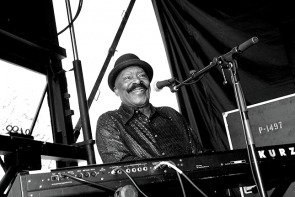
Steve Grills is well known in this town as a guy who carries the blues legacy in his guitar case. There are times, like this weekend, when he brings his interpretation of that history — and the real thing, too
"The thing I really feel appreciative of is being able to connect with somebody such as Ernest, whose history goes way back," Grills says of Ernest Lane, the 76-year-old Los Angeles blues pianist. "Connect with somebody who played with musicians I admire, like John Lee Hooker."
Lane joins Steve Grills & the Roadmasters Thursday at Dinosaur Bar-B-Q, Friday at the Syracuse Dinosaur, Saturday at Penfield's Tastin' the Blues and Sunday at Geneva Country Club. Lane's long history includes playing alongside greats such as Jimmy Nolan, Earl Hooker, Canned Heat and, oddly, the Monkees. "The Monkees' drummer," Grills says of Micky Dolenz, "used to go to a club where Earl's band was playing, and the Monkees hired them to be their backing band on tour, for like a year."
Grills met Lang when he was playing a 2002 show at Montage with Lane's old childhood friend from Mississippi, Ike Turner.
They hooked up a few times, when Grills and Rochester's own blues icon, Joe Beard, went out to San Francisco to play some club dates together. They flew Lane up from L.A. to sit in with them, leading to Grills helping Lane land a gig in June at a Nighthawk tribute at the Chicago Blues Festival.
Grills has done this before. He's played alongside Beard for many years, and befriended Robert Lockwood Jr.
"Robert Lockwood was a good friend, but I didn't get a chance to play with Robert too much," Grills says. (Lockwood died in 2006.)
"I did one recording with him, but mostly I just loved that guy's music and his playing."
As long as he's been on the scene, Grills has yet to release a CD.
"I've always kind of resisted it. I never really thought of the blues as being something commercial. And even when so many blues artists do record, it gets changed, they kind of rock it up. I've come up with something I feel really good about."
That album, with Lane on piano, will be released in a month or two.
"The thing I really feel appreciative of is being able to connect with somebody such as Ernest, whose history goes way back," Grills says of Ernest Lane, the 76-year-old Los Angeles blues pianist. "Connect with somebody who played with musicians I admire, like John Lee Hooker."
Lane joins Steve Grills & the Roadmasters Thursday at Dinosaur Bar-B-Q, Friday at the Syracuse Dinosaur, Saturday at Penfield's Tastin' the Blues and Sunday at Geneva Country Club. Lane's long history includes playing alongside greats such as Jimmy Nolan, Earl Hooker, Canned Heat and, oddly, the Monkees. "The Monkees' drummer," Grills says of Micky Dolenz, "used to go to a club where Earl's band was playing, and the Monkees hired them to be their backing band on tour, for like a year."
Grills met Lang when he was playing a 2002 show at Montage with Lane's old childhood friend from Mississippi, Ike Turner.
They hooked up a few times, when Grills and Rochester's own blues icon, Joe Beard, went out to San Francisco to play some club dates together. They flew Lane up from L.A. to sit in with them, leading to Grills helping Lane land a gig in June at a Nighthawk tribute at the Chicago Blues Festival.
Grills has done this before. He's played alongside Beard for many years, and befriended Robert Lockwood Jr.
"Robert Lockwood was a good friend, but I didn't get a chance to play with Robert too much," Grills says. (Lockwood died in 2006.)
"I did one recording with him, but mostly I just loved that guy's music and his playing."
As long as he's been on the scene, Grills has yet to release a CD.
"I've always kind of resisted it. I never really thought of the blues as being something commercial. And even when so many blues artists do record, it gets changed, they kind of rock it up. I've come up with something I feel really good about."
That album, with Lane on piano, will be released in a month or two.
MUSIC PROFILE: Steve Grills and the Roadmasters by Frank DeBlase City Newspaper on May 20, 2009
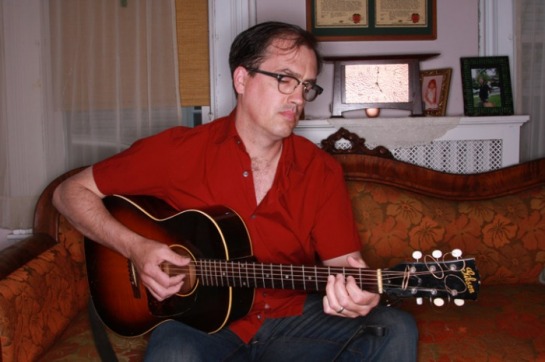
photo by Frank DeBlase
Blues guitarist Steve Grills is about as low key as they come; a tres cool operator that wields a red-hot guitar. Parked stage left, he puts his band, The Roadmasters, through the paces as he gives the audience a tour of the blues - a sampler platter, if you will, or perhaps passages off yellowy pages ripped from an encyclopedia of the blues. Mixed in with Grills' referential and reverential treatment lies the man's own sound, one that weaves in and out with the ghosts he admires and conjures.
Grills is a tremendous guitar player who possesses an equal amount of humility. He could stand to brag a little, if he wanted, but Grills plays the blues more as an unassuming acolyte in awe of the genre rather than the standard six-string grandstanders who often get in the way of the music. It's as if the blues plays Grills. And it's been playing him since he was 10 years old.
"I got interested in playing guitar through my father's love of music," Grills says from his South Wedge crib. "He was a big fan of folk music and used to go to the Newport Folk Festival in the 60's."
Grills' dad owned The Nugget (now The King and I) on East Henrietta Road from 1969 to 1972. Artists like John Prine, Steve Goodman, Little Feat, Miles Davis, and Harry Chapin all came through town to play the joint. Little Grills got to hang sometimes.
"That really got me excited about music," he says. And like just about every other kid of his generation, he was all about The Fab Four. But Grills didn't stop there. "I remember being about 9 years old, and hearing some of the early Beatles records, primarily their Chuck Berry covers. I was really attracted to those. I saw on the record ‘C. Berry' so I went out and got Chuck Berry's greatest hits. I still have that record."
Records came across his father's desk that caught his eye, and then his ear. Stuff by Jimmy Reed and Lightning Hopkins, to name a couple. And let's not forget Freddie King.
"The main guy is Freddie King," Grills says. "I just sat down and listened to his records with my guitar. I would say that's how I learned to play guitar."
At that point Grills had become interested in the roots of rock n roll. And when listening to the music of the day, Grills dug artists like Led Zeppelin, The Rolling Stones, and Jimi Hendrix, especially their bluesier stuff - you could say his tastes were running black and blue. It was a fertile time in Rochester, and a lot of the masters were still on the road.
"During the late 70's and 80's I was very fortunate to be able to see some great blues artists with some frequency," he says. "Folks like Albert Collins, Albert King, Tyrone Davis, Little Johnny Taylor, Johnny Taylor, Gatemouth Brown, and Big Joe Turner, right before he died." So Grills learned off the records he was accumulating, and by watching this parade of artists coming through town. And by the age of 19, it was all starting to make sense. However, he wasn't performing.
"I was just starting to get some of the pieces of the puzzle," says Grills. "But I wasn't really looking to play in a band. I remember bumping into my brother downtown, while I was waiting for the bus. He didn't really ask me, he just basically told me I had to be at this rehearsal for this band he was working with. ‘Be there' and I was like, ‘Oh, ok.'"
Grills' debuted on stage with Joe Likely, Al Holly, and Grills' big brother, Tom as The Midnight Blues Band. "We went down and did a little guest set between Joe Beard's sets at the K&T Tavern on Jefferson Ave," he says.
At this time, blues audiences were primarily in black clubs. Grills felt right at home. "My impression," he says, "was that black people appreciated and enjoyed seeing someone outside their sphere who appreciated their music enough to play it."
Throughout the 1980's Grills played in different outfits, including a stint with Buffalo harmonicat Shakin' Smith. Grills went solo, forming The Roadmasters in the early 90's.
Grills has worked with legends like Joe Beard and his idol, the late Robert "Junior" Lockwood - the only man Robert Johnson ever taught, as Johnson was married to Lockwood's mother. More recently Grills has played with Ernest Lane, who Grills met when he came to Rochester with Ike Turner.
Grills will play in Lane's band at this year's Chicago Blues Festival on June 14. For a bluesman of any age, this is quite a big deal. "Don't remind me," Grills says with a nervous laugh. "I try not to think about it too much."
Grills plans on releasing a record he did with Lane in the near future. Funny thing is, it's Grill's first record. "I think for me playing blues, as long as I've known blues... I've never really seen it as a commercial entity," he says. "It just never occurred to me as something I wanted to do. Obviously I realize it's something I need to do."
And as all the styles and heroes burn and melt into his soul, ultimately making their way to his fingers, one has to wonder: where is Grills in all of this? What is his signature?
"That's a good question," he says. "Maybe that hasn't even come yet. It's kind of an unconscious thing. I'm just playing what feels good to me."
Grills is a tremendous guitar player who possesses an equal amount of humility. He could stand to brag a little, if he wanted, but Grills plays the blues more as an unassuming acolyte in awe of the genre rather than the standard six-string grandstanders who often get in the way of the music. It's as if the blues plays Grills. And it's been playing him since he was 10 years old.
"I got interested in playing guitar through my father's love of music," Grills says from his South Wedge crib. "He was a big fan of folk music and used to go to the Newport Folk Festival in the 60's."
Grills' dad owned The Nugget (now The King and I) on East Henrietta Road from 1969 to 1972. Artists like John Prine, Steve Goodman, Little Feat, Miles Davis, and Harry Chapin all came through town to play the joint. Little Grills got to hang sometimes.
"That really got me excited about music," he says. And like just about every other kid of his generation, he was all about The Fab Four. But Grills didn't stop there. "I remember being about 9 years old, and hearing some of the early Beatles records, primarily their Chuck Berry covers. I was really attracted to those. I saw on the record ‘C. Berry' so I went out and got Chuck Berry's greatest hits. I still have that record."
Records came across his father's desk that caught his eye, and then his ear. Stuff by Jimmy Reed and Lightning Hopkins, to name a couple. And let's not forget Freddie King.
"The main guy is Freddie King," Grills says. "I just sat down and listened to his records with my guitar. I would say that's how I learned to play guitar."
At that point Grills had become interested in the roots of rock n roll. And when listening to the music of the day, Grills dug artists like Led Zeppelin, The Rolling Stones, and Jimi Hendrix, especially their bluesier stuff - you could say his tastes were running black and blue. It was a fertile time in Rochester, and a lot of the masters were still on the road.
"During the late 70's and 80's I was very fortunate to be able to see some great blues artists with some frequency," he says. "Folks like Albert Collins, Albert King, Tyrone Davis, Little Johnny Taylor, Johnny Taylor, Gatemouth Brown, and Big Joe Turner, right before he died." So Grills learned off the records he was accumulating, and by watching this parade of artists coming through town. And by the age of 19, it was all starting to make sense. However, he wasn't performing.
"I was just starting to get some of the pieces of the puzzle," says Grills. "But I wasn't really looking to play in a band. I remember bumping into my brother downtown, while I was waiting for the bus. He didn't really ask me, he just basically told me I had to be at this rehearsal for this band he was working with. ‘Be there' and I was like, ‘Oh, ok.'"
Grills' debuted on stage with Joe Likely, Al Holly, and Grills' big brother, Tom as The Midnight Blues Band. "We went down and did a little guest set between Joe Beard's sets at the K&T Tavern on Jefferson Ave," he says.
At this time, blues audiences were primarily in black clubs. Grills felt right at home. "My impression," he says, "was that black people appreciated and enjoyed seeing someone outside their sphere who appreciated their music enough to play it."
Throughout the 1980's Grills played in different outfits, including a stint with Buffalo harmonicat Shakin' Smith. Grills went solo, forming The Roadmasters in the early 90's.
Grills has worked with legends like Joe Beard and his idol, the late Robert "Junior" Lockwood - the only man Robert Johnson ever taught, as Johnson was married to Lockwood's mother. More recently Grills has played with Ernest Lane, who Grills met when he came to Rochester with Ike Turner.
Grills will play in Lane's band at this year's Chicago Blues Festival on June 14. For a bluesman of any age, this is quite a big deal. "Don't remind me," Grills says with a nervous laugh. "I try not to think about it too much."
Grills plans on releasing a record he did with Lane in the near future. Funny thing is, it's Grill's first record. "I think for me playing blues, as long as I've known blues... I've never really seen it as a commercial entity," he says. "It just never occurred to me as something I wanted to do. Obviously I realize it's something I need to do."
And as all the styles and heroes burn and melt into his soul, ultimately making their way to his fingers, one has to wonder: where is Grills in all of this? What is his signature?
"That's a good question," he says. "Maybe that hasn't even come yet. It's kind of an unconscious thing. I'm just playing what feels good to me."
MUSIC REVIEW: Riders on the Storm, Steve Grills
By Frank DeBlase,
September 24th 2008 City Newspaper Rochester, NY
I've frequently referred to Rochester blues guitarist Steve Grills as an encyclopedia of the blues. Well, Thursday night at The Dinosaur (and all this week at Acme Studios) Grills got to play with one of the pages of that encyclopedia, Ernest Lane. Lane is a legendary pianist of the highest caliber, known for his work with Ike and Tina Turner, and in Ike's band up until his death late last year. Lane strode the 88s with an ample sample of jump blues and boogie. And the man can belt righteously. His version of "Caledonia" is still in my big head. What makes it so hard?
MUSIC REVIEW: Steve Grills By Frank De Blase, City Newspaper August 21, 2008
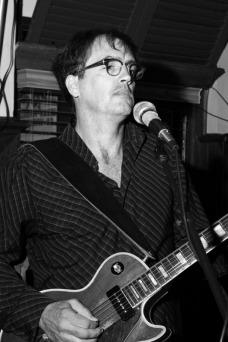
photo by Frank DeBlase
With a pompadour'd, trap-set luchadore, a long, tall, cool drink of thunder on the bass, and a pumpin' piano cat who practically 86'd the 88s, Steve Grills frosted The Dinosaur BBQ blue last Thursday night. Grills is perfection on the guitar, and he plays with equal parts reverence, accuracy, and guts. He's been a constant on this scene since the Dead Sea was just sick, and I've written about him here and there. But I gotta say, I took him for granted until Thursday night.
It was a late, loose evening with a modest crowd drinking (some a little too much) and eating (some a little too much), crowding the fringes of the dance floor, and digging Grills as he grilled the blues. Pops had a barley pop and I nursed some Joe while it all transpired before us eight bars at a time.
Yes, Grills is a flawless player with sharp licks and beautiful tone, but it's the way he adopts the mood of each song and the demeanor of its character and/or author - right down to the buxom blonde Telecaster he has rigged like the Iceman's - that knocks me out. Grills sticks to the Kings and the Reds and the Slims and the Hookers for the most part, so as to get maximum purchase on the finer points. But last week's show had a raw, almost juke joint element to it.
The band boogied for the crowd in my head as they danced cheek to sweaty cheek grinding into one another. Yes, I said "crowd in my head." Why have a few random voices when you can have a whole audience? They applaud me to sleep every night.
The real crowd was a bit more reserved, except for a few patrons who discovered their dancing shoes right around (I'm guessing) cocktail four or five. Grills is a master of ceremonies and handles everything, including drunks, pedal malfunctions, the smell of BBQ through vegan nostrils, and the occasional shout for SRV, the blues equivalent to shouting "Free Bird" anywhere else.
It was a late, loose evening with a modest crowd drinking (some a little too much) and eating (some a little too much), crowding the fringes of the dance floor, and digging Grills as he grilled the blues. Pops had a barley pop and I nursed some Joe while it all transpired before us eight bars at a time.
Yes, Grills is a flawless player with sharp licks and beautiful tone, but it's the way he adopts the mood of each song and the demeanor of its character and/or author - right down to the buxom blonde Telecaster he has rigged like the Iceman's - that knocks me out. Grills sticks to the Kings and the Reds and the Slims and the Hookers for the most part, so as to get maximum purchase on the finer points. But last week's show had a raw, almost juke joint element to it.
The band boogied for the crowd in my head as they danced cheek to sweaty cheek grinding into one another. Yes, I said "crowd in my head." Why have a few random voices when you can have a whole audience? They applaud me to sleep every night.
The real crowd was a bit more reserved, except for a few patrons who discovered their dancing shoes right around (I'm guessing) cocktail four or five. Grills is a master of ceremonies and handles everything, including drunks, pedal malfunctions, the smell of BBQ through vegan nostrils, and the occasional shout for SRV, the blues equivalent to shouting "Free Bird" anywhere else.
I Scene It: Lockwood's legacy lives,
By Frank DeBlase, City Newspaper
December 6th, 2006
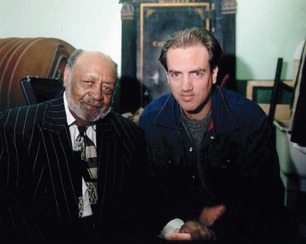
One of the few remaining Delta blues masters is gone. Robert Lockwood, Jr. passed away Monday, November 20, in Cleveland. He was 91.
Born in Turkey Scratch, Arkansas (just outside Helena) in 1915, Lockwood grew up in an area that yielded other Delta greats. At age 11 Lockwood learned guitar from the legendary, enigmatic Robert Johnson, who was living with Lockwood's mother at the time. Lockwood played with Johnson and others at juke joints, fish fries, and street corners learning his stepfather's style. Johnson's live fast, die young lifestyle caught up with him in 1937 and Lockwood headed north. He became an in-demand session player for Chess Records in the 1950s playing on recordings by Sonny Boy Williamson, Roosevelt Sykes, Eddie Boyd, and Sunnyland Slim to name a few. He also cut several sides for Mercury.
Lockwood moved to Cleveland in the 1960, and that's where he raised his family. Lockwood continued to play the blues up until his death last week.
So I'm telling you all this because Lockwood is here in spirit, through mighty influence. Lockwood came through Rochester from time to time. His music spoke in particular to bluesman Steve Grills, who caught Lockwood at The Red Creek in 1978. It left a lasting impression. The two became friends.
As most know, Grills is an extremely articulate and reverent blues musician who knows and loves all styles and nuances within the genre. But over the years, whenever he spoke of Lockwood, his eyes would light up. Lockwood's style seemed to excite more than most. Grills traveled to Cleveland frequently to catch the man at his weekly gigs. He even got the chance to record with him on a Shakin' Smith project. Among the countless guitarists that influence Grills' style, Lockwood's floats undeniably on top."He was one of my all-time favorite guitar players," Grills says. "And just a great guy. He was as dedicated to the tradition he came from as he was in being a progressive artist. He was always evolving."
So when you hear Grills, you'll be hearing Lockwood too. And though he's gone, the most important part of his life --- and American music history --- remains bristling at Grills' fingertips.
Born in Turkey Scratch, Arkansas (just outside Helena) in 1915, Lockwood grew up in an area that yielded other Delta greats. At age 11 Lockwood learned guitar from the legendary, enigmatic Robert Johnson, who was living with Lockwood's mother at the time. Lockwood played with Johnson and others at juke joints, fish fries, and street corners learning his stepfather's style. Johnson's live fast, die young lifestyle caught up with him in 1937 and Lockwood headed north. He became an in-demand session player for Chess Records in the 1950s playing on recordings by Sonny Boy Williamson, Roosevelt Sykes, Eddie Boyd, and Sunnyland Slim to name a few. He also cut several sides for Mercury.
Lockwood moved to Cleveland in the 1960, and that's where he raised his family. Lockwood continued to play the blues up until his death last week.
So I'm telling you all this because Lockwood is here in spirit, through mighty influence. Lockwood came through Rochester from time to time. His music spoke in particular to bluesman Steve Grills, who caught Lockwood at The Red Creek in 1978. It left a lasting impression. The two became friends.
As most know, Grills is an extremely articulate and reverent blues musician who knows and loves all styles and nuances within the genre. But over the years, whenever he spoke of Lockwood, his eyes would light up. Lockwood's style seemed to excite more than most. Grills traveled to Cleveland frequently to catch the man at his weekly gigs. He even got the chance to record with him on a Shakin' Smith project. Among the countless guitarists that influence Grills' style, Lockwood's floats undeniably on top."He was one of my all-time favorite guitar players," Grills says. "And just a great guy. He was as dedicated to the tradition he came from as he was in being a progressive artist. He was always evolving."
So when you hear Grills, you'll be hearing Lockwood too. And though he's gone, the most important part of his life --- and American music history --- remains bristling at Grills' fingertips.
